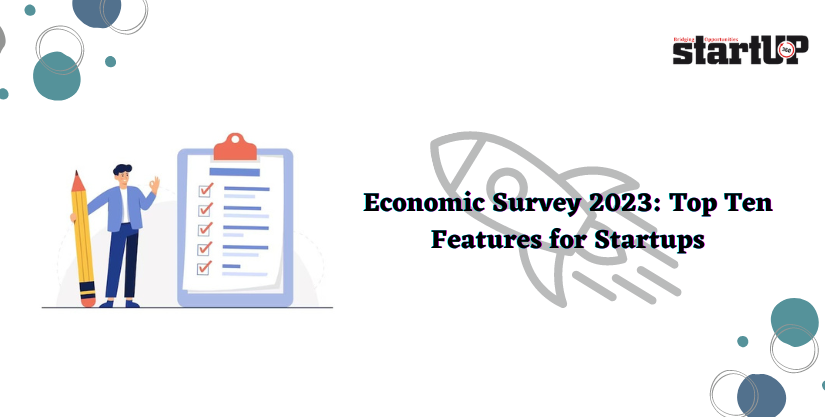Economic Survey 2023: Top Ten Features For Startups
According to the Economic Survey 2022-23, the number of officially recognized startups surged to 84,012 in 2022 from 452 in 2016 as a result of investment incentives and easier corporate compliance requirements. The survey which was presented by finance minister Nirmala Sitharaman in Parliament at the start of the Budget session on Tuesday explained ten features for startups. The Economic Survey 2023’s main points on India’s startup ecosystem are as follows:
1. Reverse flipping: Will It Become A Trend?
According to the Economic Survey 2023, Indian entrepreneurs are thinking about “reverse-flipping,” or relocating their domicile back to India. The comments follow the fintech startup PhonePe’s decision to shift its headquarters from Singapore to India, a move that cost its investors nearly 8,000 crores in taxes.
Flipping is the process of giving a foreign corporation complete ownership of an Indian business. According to the poll, it typically occurs in the early stages of businesses and is motivated by the financial, tax, and personal preferences of the founders and investors.
However, recent modifications to roundtripping regulations, a thriving private equity/venture capital ecosystem, and the maturing of India’s financial markets have not only slowed down the flipping but also led some businesses to consider reverse flipping, according to the Economic Survey.
2. Streamlining the ESOP Policy
The Economic Survey assessed how crucial it would be to assist reverse flipping by altering the taxation of employee stock option programs (Esops). At the time of allotment or transfer of the shares, the fair market value (FMV) of ESOPs is currently taxed as pay in the hands of the employee in India. Esops should only be taxed at the time of sale and not at the time of vesting, according to industry demands.
3. Taxing Capital Gains More Moderately
The necessity of streamlining capital gains taxation is another major issue raised by the Economic Survey 2023 to encourage investments in India as well as reverse flipping.
Demands for tax parity between listed and unlisted shares have come from investors in Indian companies. Gains on listed shares are now taxed at a lower rate of 11.96% and are deemed long-term if held for more than a year. For listed shares, the short-term capital gains tax rate is 15%.
4. Simplifying Capital Flows Compliance
The report emphasized the need for streamlining capital flow processes and noted that many nations, like the US, UAE, Netherlands, and Singapore, have simpler corporation rules with fewer limits on capital inflow and outflow as well as how hybrid securities are treated.
For instance, profits paid from a Singaporean firm or subsidiary are not subject to holding-level taxation in Singapore. When paying dividends to shareholders who are residents or non-residents, no taxes are withheld. The dividend is one of the most widely used techniques for repatriation, thus this is a crucial element, according to the poll.
Additionally, the UAE currently has no withholding taxes, in contrast to European nations like the Netherlands, which have lower capital gains taxes based on shareholding criteria.
According to the Economic Survey, “These exemptions are not currently accessible in India, and any migration of existing structures to India results in capital gains tax.”
5. New India’s Backbone
DPIIT acknowledged that startups supported the wider economy by generating more than 9 lakh direct jobs. The poll found that compared to the typical number of new employment produced over the previous three years, the number of jobs created by these companies increased by 64% to 269,000 in 2022. Startups are seen as the “spine of the new India,” as they inspire young people to create jobs rather than just look for them.
6. Scaling localized hyperscale
The number of startup centers in India is rapidly increasing, especially in Tier-2 and Tier-3 cities. Startups there are mostly addressing issues with healthcare, education, agriculture, and financial services at a local level. Currently, Tier II and above cities account for over 48% of Indian startups. It was described as a testament to the enormous potential of India’s grassroots by the Economic Survey.
7. For the Agrarian Economy: Solutions
India’s agrarian economy necessitates a lot of space innovation, notably in the areas of sustainability and commerce. Startups in India are currently rising to the occasion. According to the Economic Survey 2023, the nation has more than 1,000 agritech businesses that help farmers advance their farming practises.
According to the statement, during the previous four years, private equity investments in the agritech sector have increased by more than 50% annually, totaling around $6600 crore.
8. Improvement of the IPR Process
According to Economic Survey, the government has strengthened Intellectual Property Rights (IPR) by modernising the IP office, lowering legal compliances, and facilitating IP filing. This has led to a 46% increase in domestic patent filings between 2016 and 2021, indicating India’s shift to a knowledge-based economy. Startups primarily filed these patents.
9. Taking Off
India’s drone industry is growing thanks to the “Drone Shakti” project. According to the report, drone startups and drone-as-a-service (DrAAS) are being supported and about 90% of the airspace has been designated as a green zone for flying drones up to 400 feet.
10. Problems With Startups
According to the Economic Survey 2023, the biggest obstacles for Indian entrepreneurs include finding finance, finding a way to make money, getting access to enabling infrastructure, and navigating the regulatory and tax systems.

